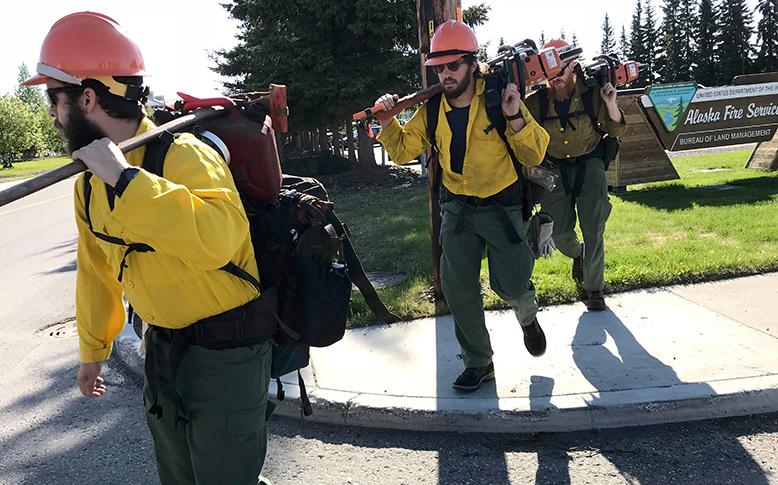
Fire Duty in Alaska
The following information is intended for U.S. Government Employees who are "Resource Ordered" for fire duty in Alaska. Find more information on the Alaska Interagency Coordination Center webpage for out of state resources.
Alaska fire suppression operations exemplify the concept of total mobility. Many fire suppression resources are centralized at Fort Wainwright (Fairbanks) until mobilized in response to a known or predicted area of fire occurrence. A point to remember is that even if your resource order says Fairbanks or Anchorage as the destination, this does not mean you will end up there. Be prepared to go to a remote site (which includes fire camps and wilderness settings) on any assignment to Alaska. As the fire load shifts from area to area, suppression and support resources are relocated to meet the need where it occurs. With few exceptions, Lower 48 personnel are managed as an interagency resource pool. The major exceptions are smokejumpers, most administrative personnel, and some highly specialized positions, (i.e. radio techs.) The remainder of personnel are formally recognized as the Alaska Resource Pool, which is managed by the Fire Specialist Section (FSS) Duty Office, while in Fairbanks.
- Physical Fitness Requirements
-
More stringent physical fitness requirements may apply in certain situations in Alaska than would apply in other areas of the country. For instance, even those individuals assigned to a fire camp in Alaska may be required to have a pack test rating of at least "light" on their red card. MAKE SURE TO BRING YOUR RED CARD WITH YOU.
- Subsistence
-
Personnel who come to Alaska on a resource order will normally be subsisted whether they work for the State of Alaska or for BLM Alaska Fire Service.
- Living Situations
-
While at Fort Wainwright, barracks or alternate housing will be provided. Two persons may be assigned per room. The rooms are quite comfortable, with a shared bathroom and are supplied with bedding and towels. While these rooms do lock, you are advised not to use your barracks room for long term storage of valuables. During periods of high fire occurrence many people are assigned rooms in the barracks on a temporary basis and your roommates may change. It is best to live out of a pack and take all your gear with you whenever you go on assignment.
- Meals are available at the dining hall. The food is very good and provided at no charge.
- Transportation into Fairbanks from Fort Wainwright may be provided on an as needed basis to allow individuals to shop for necessities.
- Housing at field stations will range from elaborate to rustic. All field stations have a mess hall, but you may be required to do your own cooking.
- When on fire assignment the living conditions will often be in a wilderness setting and may require camping for prolonged periods. There will most likely be no public telephone, indoor toilets, showers, or other amenities. The food situation consists of MRE's and fresh food that you cook over a campfire.
- Equipment
-
Specialized equipment required by your assigned job will be issued to you at your assignment location. You will not be asked to provide any gear beyond your personal clothing and effects. Standard gear issue for surviving in the field in Alaska is called an EFF Pack (weight is 20 pounds). A fire pack is available but not automatically issued upon arrival. If this gear is issued, it will be part of your 65-pound limit.
EFF Pack contains the following:
- 1 sleeping bag
- 1 pair ear plugs
- 1 pair gloves
- 1 quart canteen w/cover
- 1 mosquito net
- 1 insect repellant
- 1 hand towel
- 1 1st Aid Kit
- 1 10 inch file w/handle
- 1 hk. EFF cord
- 1 hard hat
- 1 bar soap
- 1 foot powder
- 1 rubberized bag (to hold)
- What to Bring
-
Plan to be mobile, regardless of your assignment. Limit your personal and fire gear to one easily carried bag (red backpack type) totaling no more than 45 pounds. In addition, a day pack or web gear may be carried but must not exceed 20 pounds. Weather in the interior can range from very hot to fairly cool. Be prepared to stay comfortable for many days in cool wet weather. Your comfort will depend on your ability to stay warm and dry. Quality rain gear is a must. Wool or other materials which retain their insulating capacity when damp is recommended. Bring clean socks, underwear, a sweater and an extra pair of boots if possible. The living conditions will consist of a tent (bring your own) and a sleeping bag. Visqueen and mosquito netting are available. Plan to be self sufficient in terms of personal effects and toilet items for 21 days. Don't forget a good book and a supply of pocket money.
Required Items:
- 8-inch leather lace boots with heavy lug soles (in good condition)
- Rain Gear
- Warm jacket
- Extra socks (non-synthetic - cotton or wool)
- Extra underwear (non-synthetic - cotton or wool)
- Fire shirt(s)
- Fire pants
- Hard hat
- Gloves
- Tent
- Sleeping Bag
Suggested optional personal items:
- Hat or cap
- Handkerchiefs
- Toothbrush and toothpaste
- Comb and brush
- Shaving items
- Hygiene products
- Sunglasses
- Vitamins
- Medication
- Tobacco products
- Matches or lighter
- Knife and stone
- Camp pants and shirt
- Extra shoes or boots
- Pad and pen
- Spices for food
- Boot grease
